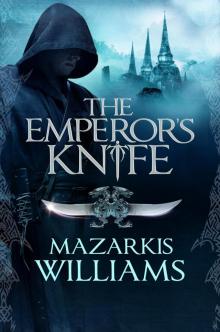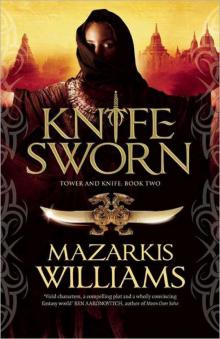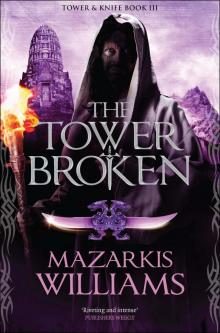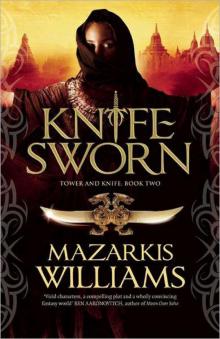- Home
- Mazarkis Williams
Tower & Knife 03 - The Tower Broken
Tower & Knife 03 - The Tower Broken Read online
First published in Great Britain in 2013 by
Jo Fletcher Books
An imprint of Quercus
55 Baker Street
7th Floor, South Block
London
W1U 8EW
Copyright © 2013 Mazarkis Williams
The moral right of Mazarkis Williams to be identified as the author of this work has been asserted in accordance with the Copyright, Designs and Patents Act, 1988.
All rights reserved. No part of this publication may be reproduced or transmitted in any form or by any means, electronic or mechanical, including photocopy, recording, or any information storage and retrieval system, without permission in writing from the publisher.
A CIP catalogue record for this book is available from the British Library
ISBN 978 1 78087 148 6 (HB)
ISBN 978 1 78087 149 3 (TPB)
ISBN 978 1 78087 150 9 (EBOOK)
This book is a work of fiction. Names, characters, businesses, organizations, places and events are either the product of the author’s imagination or are used fictitiously. Any resemblance to actual persons, living or dead, events or locales is entirely coincidental.
You can find this and many other great books at:
www.quercusbooks.co.uk
www.jofletcherbooks.com
Also by Mazarkis Williams
The Emperor’s Knife
Knife-Sworn
For James
1
Farid
Farid’s captors pushed him through the doorway. One moment he was standing in the alley, four hands holding him iron-tight at the shoulders, and the next, he was falling towards a pocked stone floor. He braced for the feel of cold granite against his cheek, the burn as it scraped his skin away, but then he flailed and righted himself. This was a small house – if it was a house – and a third of the space was taken by stairs rising up into darkness. The shadows beneath them held a man in dark robes, startled, judging by his posture, a book held against his lap. Then strong hands took Farid again and steered him into the only other room, small and lined with shelves, stinking of foreigners’ ale.
They shoved him against the far wall. He struggled to hear the words being murmured in the other room. The man from the shadows was asking questions – Farid could tell from the tone – but the words were too low for his ears. Just one captor stayed with him now. Farid sneaked a glance: he looked to be about his own age, and just as muscled. It would be a fair fight if it came to that. When his captor leaned over to pull on a length of fresh-smelling rope Farid got up to run, but with a casual movement of his foot the other man tripped him and he skidded against the hard floor. While he was lying there stunned, jaw and arm smarting from the impact, his hands were tied behind him.
‘Why are you doing this?’ He did not expect an answer – from the time they grabbed him in the marketplace there had been no words. But they wanted something, otherwise he would be dead. The man half lifted, half pushed him into a wooden chair, then smiled, not a kind smile, though Farid sensed he could probably manage a semblance of such. He had smooth skin and regular features, not the sort one usually found in the Maze; more the sort you’d find in a comfortable position at a noble estate.
Or the palace. The palace takes the best of us, his father always said: the ones who showed unusual talent. The hardest workers. The strongest, the prettiest.
The palace would not have brought him to a tiny corner of the Maze, though. The palace would have taken him to a guard station in one of its outer walls, or worse, to the cold, dark cells hidden below its soaring towers. He had heard a person would do the unthinkable just to be free of them. Could this man have been in the prison dungeon, done something unthinkable?
Farid looked away, desperate to hide the current of his thoughts.
For months the Blue Shields had been in the Maze, hunting down the slave rebels and escaped prisoners, killing them in the streets and in the warrens where they hid. During this time the larger city had carried on with its usual business of exchanging goods for coin, and Farid with them. He had not considered the Maze and its outlaws his concern. Refugees from the north were a greater problem, crowding the streets and frightening his customers with rumours of deadly storms. He’d cursed them – too poor to pay for his fruit and too rich to disappear into the dark corners and alleys of the city and be out of his way. But now that he was tied to a chair and at the rebels’ mercy, he knew the refugees had been no more than a distraction.
The man laid a callused hand on Farid’s cheek, the way his mother might. Startled, Farid looked back into his tea-coloured eyes.
‘What did you see?’
Farid swallowed. ‘What happened back there? I heard—’ Nothing. He’d heard nothing more than a chorus of gentle moans, drifting like ash on the wind.
‘There was an attack.’ The man from the shadows stood in the doorway, lowering the hood of his red robe to reveal a shock of white-blond hair. Farid’s pretty captor stood and lowered his head in deference.
‘An attack?’ Farid wiggled against his ropes. His hands felt numb. ‘It wasn’t me. I was …’ He had been looking down at the street-stones when they grabbed him.
The leader moved forwards, a look of sorrow on his face. ‘You saw them, didn’t you?’
‘Saw them? Who?’ But at last Farid remembered. He had seen a glimmer in the afternoon light, had left his stall and squatted in the street to investigate. Shapes and lines, glimmering not on skin but on stone. He had thought it art, perhaps, or someone’s idea of a joke. ‘The marks.’
‘The marks.’ This time it was the leader’s turn to repeat.
‘What do they mean?’ Farid wiggled against his bonds again, looking from one man to the other. ‘Has the Pattern Master come back?’ Part of him hoped they would not answer.
‘No, this is not the pattern, not as you know it.’ The leader waved to the other man, who knelt to untie the ropes. Farid felt them loosen. ‘I apologise for the manner in which you were taken. Let’s begin again. My name is Adam.’
‘I’m— My name is Farid.’ So this was about something they wanted. He relaxed a little. He knew how to barter and how to bluff.
‘Farid.’ Adam held forth a flask. The old greeting, done with metal rather than skin.
The ropes slid away. Farid brought his hands forwards and rubbed them together before reaching for the flask. He said, ‘I don’t know who you think I am. I sell fruit in the marketplace. Now my week’s haul is left untended.’ He made his voice heavy with disappointment, emphasising he’d already made a sacrifice. That would have to go into whatever deal these men had in mind. As he drank, he studied Adam. His build named him soldier; the robes named him priest. His bright hair spoke of the north, of Yrkmir. Of the enemy.
Adam showed his palms in a gesture of honesty. He knew the ways of Nooria, wherever he had come from. ‘Your fruit is gone, along with every living soul in that marketplace.’
‘What do you mean?’ Farid grabbed the flask with both hands to keep from dropping it. There had been children there, old men, scrawny dogs, every one of them breathing and alive.
‘Those marks destroy all that is or was alive. Once they surround a man he is already dead. But you saw them, and were saved.’
Farid had seen them. He remembered leaving his stall, cautioning the boy who always sat on the barrels not to sneak an apple. He’d known the boy would do it anyway; he did it every time. It didn’t matter. The boy kept good watch for him otherwise, from men and animals alike. Now Farid couldn’t remember his name – he never forgot anything, and yet today, his memory failed him. Gone. Was the boy truly gone? It was impossible. He stood. ‘I wan
t to see.’
Adam pulled a piece of chalk from his robe and crouched. As he drew a white line against the stone Farid snapped, ‘No, not the marks.’ He had seen enough of the marks when the pattern took his mother. ‘I want to see the marketplace.’
‘It will not be a pleasant sight. In any case we can’t let you go – not yet. The Tower will be searching for us.’ Adam said ‘the Tower’ the way most people said ‘Yrkmir’, hushed and wary. But then his hair, so bright, had already been a warning. These men were more than escaped prisoners: they were the worst of them: the very Mogyrks who had fomented rebellion in the first place.
‘But I’m not one of you. I am a citizen of Nooria.’
‘And yet you see the marks.’
‘So you said. What does it matter?’ Farid could not imagine what deal these Mogyrks might propose; he could not imagine why he still lived. It must have been they who attacked the marketplace, they who had killed everyone inside. Muad: he remembered the boy’s name now. Muad.
‘The patterns that lay a ward or an attack cannot be seen once they are set – not by anyone with normal eyes. You are blessed by Mogyrk to see them,’ said Adam, looking up at him from his position on the floor, sure and calm, though Farid towered over him. ‘The marks protect and strengthen those who are holy and hide from those who are not.’
Farid had seen plenty of marks when the pattern ruled Nooria, when his mother had suffered and died, when Helmar had controlled half the city and sent the other half into hiding. ‘I’m not holy. I’m a fruit-seller. My father is coming upriver tomorrow with another load. He’ll be expecting me to meet him.’
Adam continued as if Farid had not spoken, ‘You are Cerani, but He has chosen from Nooria before. It is not for me to say why. You can see the pattern-marks.’
‘Again, what does it matter?’ He wanted to punch the man. ‘What do you want?’
Adam looked up at him with eyes of the clearest blue. ‘You saw those pattern-marks. That means you can also use them.’
2
Mesema
Mesema unrolled a map of Nooria, laid it over the table engraved with the whole of Cerana and squinted. Nessaket had warned her that reading would take its toll on her eyesight, but maybe it was only the darkness of the library that made the lines swim under her gaze. The cartodome harboured a surprising number of shadows. She pushed the table towards the only window, where sunlight spilled in through the open screens.
‘Majesty! Please, allow us.’ Willa took one corner of the table and Tarub the other.
‘So you say with every turn of the glass. If it were up to the two of you, I would do nothing but sit in the bath all day until someone thought to take me out of it.’
Tarub giggled as she set the table down under the window, then raised a hand to dispel the dust that danced in the sun like fireflies. Fewer hands cleaned the palace these days. Between the slave rebellion and the pale sickness, Azeem estimated they had lost a third of their workers, but Sarmin had put a hold on the buying and selling of slaves while he focused on a new code for their treatment. Mesema was never sure that words on parchment could truly alter the way of things. She remembered hurrying past under the resentful glares of her father’s Red Hoof captives, the hatred that guided their every word and posture. Even as a child she had understood they wanted to be free. Nessaket’s injury and the kidnapping of Sarmin’s brother Daveed had grown from such a legacy, and she was not certain Sarmin’s code would bring it to any resolution.
Tarub and Willa showed no such concerns. Azeem said their happiness to serve came from being taken as children, that they knew no other life. He too, had once been a slave, and he thought it the way of things. For centuries slaves had kept the empire running and few who lived in it could imagine it any other way. Yet something in her said they must start to do just that.
Tarub broke into her thoughts and pointed out the window, up into the sky. ‘Smoke, Your Majesty!’ Dark plumes rose in the distance, drifting on the air. This had become the sign of unrest in the city as Mogyrk saboteurs took flame to guard posts and temples. Usually it stayed inside the Maze, but this smoke came very near, its ash drifting over the walls of the palace compound.
‘That is the Festival of Meksha,’ said Willa, always the sensible one. ‘What you see are the smoke and ashes from the offerings, Your Majesty.’
‘Oh.’ Mesema had not been to a festival since she left the grass, but the celebration of a volcano-goddess did not appeal. One last glance out of the window, then she turned to her task, pulling five marble pieces from her belt, the kind used by soldiers to mark enemies on the field. One she placed over Beyon’s tomb, once fallen to dust, and then repaired by Sarmin; this represented one of the blood-works Helmar Pattern Master had made to anchor his great spell. He had tricked Beyon into taking his own life and then used his blood to power the symbols hidden there.
She pushed the memory away and put a second piece along the river to the north, at the town of Migido, where Helmar had murdered the inhabitants and set their bodies into his design. Both the tomb and Migido had turned into great wounds, tainted by the death of the Mogyrk god and leaching colour and life from all they touched. Sarmin had healed the tomb, but still the emptiness in Migido crept ever south and east, towards Nooria and the river the Cerani called the Blessing.
The refugees from Migido had a name for it, borrowed from the nomads: the Great Storm.
Mesema took a deep breath. They had some time; the Storm in all its forms still remained distant. She placed a third marker to the northwest. The desert headman Notheen had spoken of a void in the reaches of the desert. That could be where Helmar’s church had been – the church she had seen when first she came here, where she had learned a path through the pattern. Later Grada had killed the true body of the Pattern Master there.
She clicked the last two markers together in her palm. Five: that was always the number of Helmar’s pattern; always groups of five carried out the Pattern Master’s deeds. Five wounds: one healed and four remaining; four mouths to open and release the Storm, and nothing to stop them. In the eastern desert she placed a marker. This was where the Mogyrk god had died, and the scar he had left was larger than any wound made by Helmar. The eastern desert lay harsh and barren between Nooria and its farthest province; those who wished to travel in between sailed from the south rather than braving the sands. The eastern gate, called the Dawn Gate, but more widely known as the Dry Gate, had fallen into disuse and was now sealed.
She had placed four markers so far. The last she held in her palm, a mystery.
Sarmin said the pattern-skill had left him, that when he looked at a thing, the thing was all he saw – not the designs that made it what it was. ‘The pattern is a lie that is also true,’ he had said. Mesema felt she was just on the edge of understanding it. She had told many lies that felt true, such as framing a thought that was just beyond her, or telling a story the way she wished it had truly happened. The story she told herself today was that the Great Storm could be stopped with figures and a map.
‘Your Majesty,’ said Tarub, her eyes cast humbly aside, ‘perhaps Pelar is hungry.’
‘He is sleeping.’ If she entered the room her son would know it and never rest until she held him in her arms. She smiled to think of his stubborn nature. He took after Beyon and her father both. Best to leave him in peace. Mesema traced the River Blessing on the map. It began in the mountains, ran past the fields that provided them with fruit and grain and down into the city of Nooria. She frowned, tracing the distance from the caravanserai of Migido to the river. The void had turned Beyon’s tomb to dust; what might it do to Nooria’s precious water?
‘Perhaps the Empire Mother seeks you for a game of Tiles, Majesty,’ said Willa.
Mesema doubted it. Nessaket’s injury had left her in great pain, and bouts of dizziness kept her bedridden much of the time. When she was able to visit Mesema, she carried her grief for Daveed along with her, bringing the shadow of his loss to all co
rners. Mesema would have done anything to fix the Empire Mother’s pain, but she was powerless as anyone when it came to that. The royal guards and assassins still searched for Austere Adam and his followers, hoping Daveed was in their care, but in truth the babe could be as far away as Yrkmir. Sarmin spoke little of it, but she saw in the shadows of his eyes that it pained him too.
Mesema made a jest, hoping to lighten the mood. ‘You think my work is not ladylike and hope to distract me from it.’
Willa leaned forwards, her expression serious. ‘Everything you do is most ladylike, my Empress. It cannot be otherwise.’
‘Hm.’ Mesema felt a rush of air over her skin and went still, one finger still poised over the blue line on the map. It had been long months since she had seen a message in the wind. The Hidden God did not live in the desert and must travel long miles to give her sight, but she watched and hoped as the breeze became a gust, carrying sand and ashes from Meksha’s fires into the room. The map lifted from the table. For a moment it twisted, caught in the current, then landed on the floor, ashes circling it like bees around a hive. Their movements gained structure and purpose, finally gathering over the western quarter of the mapped city and forming a bright blue circle over the Holies. Then the wind blew again and scattered them to all four corners of the room.
‘Did you see that?’ asked Mesema, scrambling on her knees after the map.
‘Your Majesty! You must let me—’
But Mesema already had it in her hand, seeking the building the pattern had indicated. ‘Here.’ She tapped the depiction of a large rectangular estate up on the Great Plateau. ‘That’s the place. Tarub,’ she said, standing and brushing off her knees, ‘I need servant’s garb and a pouch of water and—’ She thought what normal townsfolk might carry. ‘A veil.’
‘Yes, Your Majesty,’ said Tarub, bowing. ‘But … why?’
‘Because I am going into the city.’

 The Emperor's knife
The Emperor's knife Knife Sworn tak-2
Knife Sworn tak-2 Tower & Knife 03 - The Tower Broken
Tower & Knife 03 - The Tower Broken Knife Sworn
Knife Sworn